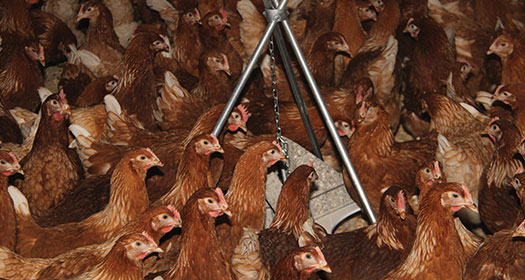
MPs looking into the pig and poultry sectors have been taking evidence from representatives of the United Kingdom’s egg industry during a series of meetings in Westminster.
As the Ranger went to press members of the All Party Parliamentary Group (APPG) for Eggs, Pigs and Poultry were hearing oral evidence from some industry leaders. The British Free Range Egg Producers’ Association (BFREPA) submitted its evidence in written form and, once again, BFREPA expressed its fears about the impact on the industry if the Government opted to go ahead with a complete ban on beak trimming in 2016. The association urged the all party group to use its influence to persuade the Government not to go ahead with the ban. It pointed to failures in a cur-rent beak trimming trial in which commercial laying flocks had suffered high mortality rates whilst being managed without the use of beak trimming.
A beak trimming ban was due to begin in 2011 but the Government decided against its introduction on the advice of the Farm Animal Welfare Council (FAWC). FAWC said it was concerned about the impact of feather pecking and cannibalism if the ban went ahead. The Government decided that beak trimming should continue, although it ruled that the industry should in future use only the infrared method of trimming. It said it would hold a review in 2015 with the intention that the ban be reinstated in 2016.
Researchers at the University of Bristol have been conducting trials to establish how layer flocks could be managed without the use of beak trimming and evidence from those trials will be studied by the Beak Trimming Action Group, which will advise the Government in 2015 on what it should do about beak trimming. However, outbreaks of injurious pecking in two of the three commercial flocks involved in the trials have heightened the egg industry’s fears about the consequences of a trimming ban. A 16,000-bird free range trial flock in East Anglia had to undergo emergency beak tipping after injurious pecking resulted in a mortality rate of 20 per cent. On another free range trial unit in Yorkshire the mortality rate hit 15 per cent amongst birds whose beaks were left intact. After the second pecking outbreak, BREPA called on the Government to bring its decision forward and immediately announce that a ban would not be imposed. This call was rejected by Farming Minister George Eustice, who said that the trial should run its full course.
The All Party Parliamentary Group for Eggs, Pigs & Poultry has been holding its evidence sessions at the Houses of Parliament. It has been taking evidence from industry representatives as well as from interested groups like the RSPCA. The APPG is looking into issues such as planning and anti-biotics as well as the issue of animal welfare. BFREPA made its submission in a document compiled by the association’s director of policy, Robert Gooch.
BFREPA said that the trials being conducted by Bristol University did not, in any event, truly re-flect commercial free range production. Only three of 20 flocks involved in the trials were of a commercial scale. It said only the findings from these three flocks should be used to inform the Government’s decision on whether beak trimming should be outlawed.
“One of these non-beak-tipped flocks has suffered a severe outbreak of injurious pecking leading to the death of a quarter of the birds of the flock,” said the association in its submission.
“These mor-tality rates are unacceptable to producers, consumers and the general public. We understand a se-cond flock is also suffering unacceptable levels of mortality,” it said. “All the scientific evidence to date suggests that the free range egg industry does not have the tools in its armoury yet to prevent injurious pecking in commercial flocks of hens with non-tipped beaks.”
The association told the MPs that the behavioural traits of laying hens in free range systems needed to be improved genetically by breeding companies before a ban was imposed and it called on politicians to delay a ban until such genetic improvements were available to producers.
Calls for the Government to delay a ban on beak trimming have come from a wide body of opinion. Eight vets who are all members of the British Veterinary Poultry Association (BVPA) - including the association's president, Keith Warner - wrote to the Environment Secretary to warn that going ahead with the ban at this time would be bad for animal welfare. They said they wanted the ban put off until it could be shown that commercial laying flocks could be managed without the risk of injurious pecking.
The British Egg Industry Council (BEIC) and the National Farmers’ Union (NFU) have also called for the ban to be cancelled, along with BFREPA. And a senior scientific officer with the RSPCA, Mia Fernyhough, recently conceded in a discussion on BBC radio that a complete ban on beak trimming may not be able to go ahead as planned in 2016. She said that the Government may need to look at the possibility of a partial ban.
In its submission to the All Party Parliamentary Group, BFREPA said that free range production, including organic, now accounted for about half of the total egg consumption in the United Kingdom. Free range egg production and consumption had grown at an average rate of eight per cent per year over the last 20 years.
The association said the future viability of free range egg production was linked to the public’s per-ception of the health and welfare of free range hens and the welfare consequences of not beak trimming hens were severe. It said that whilst the Bristol University beak trimming trials would not be concluded for another year, the evidence so far suggested that banning beak trimming could devastate the welfare of hens in up to two thirds of commercial free range flocks.
It said that this was clearly unacceptable.
